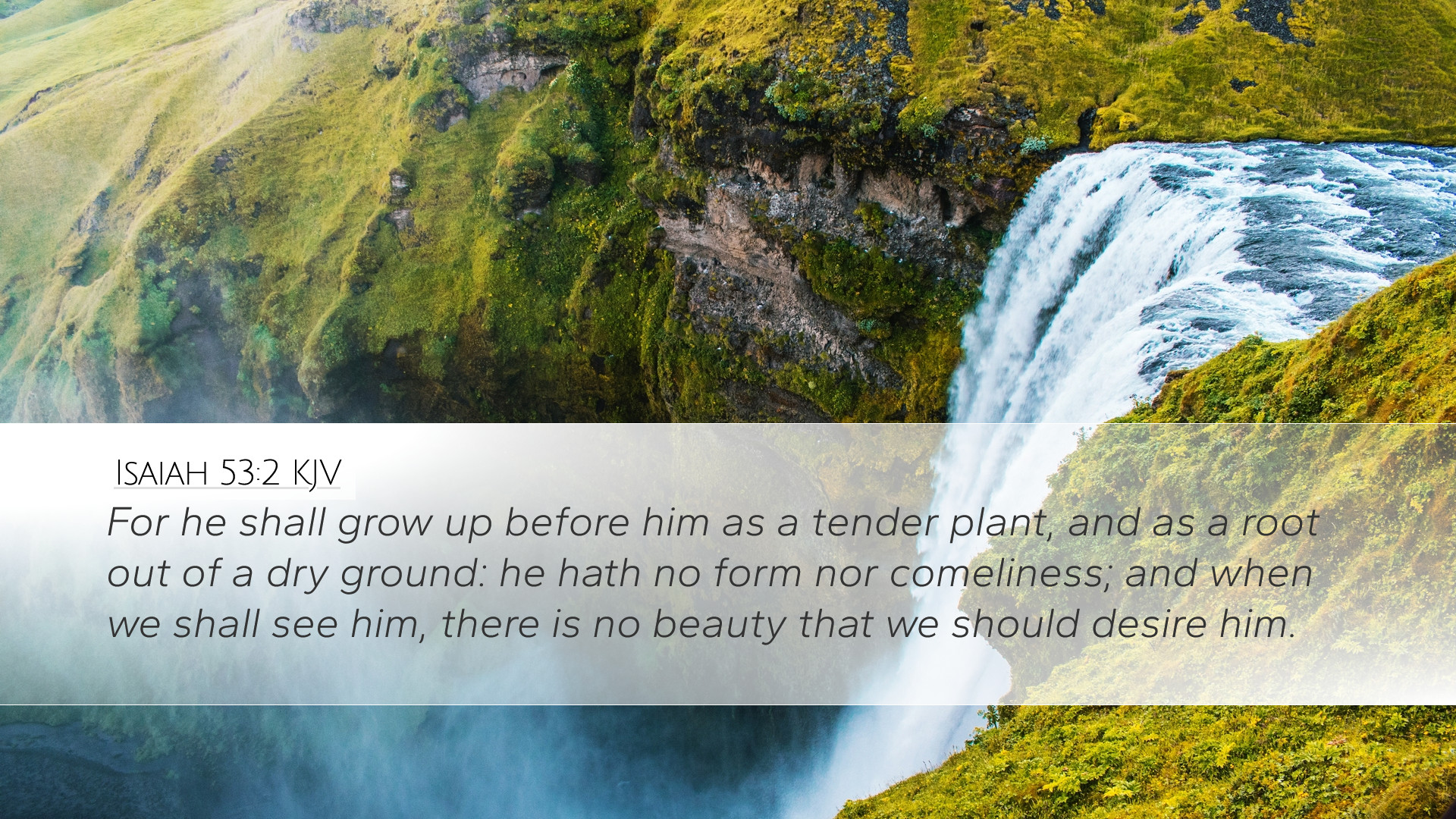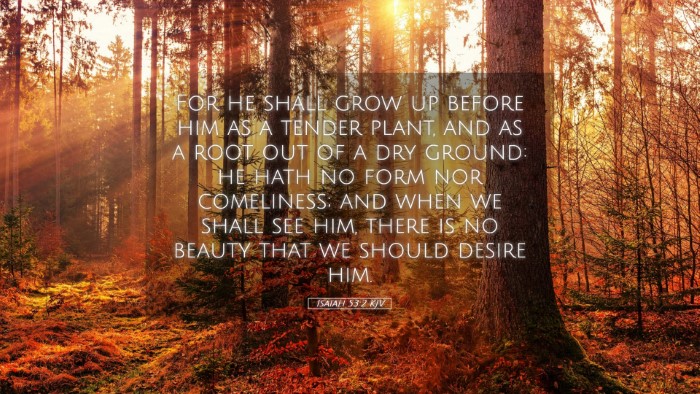Commentary on Isaiah 53:2
Isaiah 53:2 states, "For he shall grow up before him as a tender plant, and as a root out of a dry ground: he hath no form nor comeliness; and when we shall see him, there is no beauty that we should desire him." This verse is often seen as a profound prophecy concerning the Messiah, emphasizing his humble beginnings and the rejection he would face from humanity. This commentary gathers insights from esteemed public domain scholars to explore its depth and significance.
Contextual Analysis
The context of Isaiah 53 is crucial. It presents a portrait of the Suffering Servant, a figure who will bear the sins of many. This chapter is part of the larger narrative in the Book of Isaiah, which frequently oscillates between themes of judgment for Israel and hope for restoration. The servant's portrayal here invites a deep reflection on the nature of God's plan for salvation, highlighting that God's ways are not aligned with human expectations.
Insights from Matthew Henry
Matthew Henry remarks that the Servant's “growing up” suggests an inconspicuous beginning, much like a “tender plant.” This imagery implies the vulnerability and insignificance that the Messiah would present to the world. Henry notes that the “root out of a dry ground” symbolizes a powerless origin; a root in arid soil is unlikely to flourish. This reinforces the Servant's humble and unassuming entrance into humanity, which contrasts sharply with prevailing expectations of a mighty and dominant leader.
Insights from Albert Barnes
Albert Barnes emphasizes the phrase “no form nor comeliness” indicating that the Messiah would lack the physical appeal that people often desire in a leader. He suggests that this aspect was part of God's divine plan to ensure that faith, rather than external appearances, would be the basis of recognition. This prophecy is significant as it foretells the eventual rejection of Jesus from those who were drawn to worldly grandeur. Barnes further elaborates that the Servant’s unattractiveness serves a greater purpose within the scope of faith, revealing that true beauty lies in spiritual understanding and divine favor rather than earthly beauty.
Insights from Adam Clarke
Adam Clarke provides a comprehensive theological perspective, asserting that the 'tender plant' reflects a state of gentleness and innocence. He highlights that despite the Servant's lowly beginnings, he would fulfill his calling with steadfastness. Clarke also touches upon the implications of being “a root out of a dry ground,” interpreting it as a symbol of resilience and fortitude amidst adversity. This resilience becomes a powerful message in teaching believers that God can bring life and purpose from seemingly impossible circumstances.
Theological Reflections
As pastors, theologians, and students reflect on Isaiah 53:2, several themes emerge:
- Humility and Servanthood: The depiction of Christ as a tender plant challenges earthly notions of power and authority, inviting believers to embrace humility in their own lives.
- The Unexpected Nature of God's Plan: God's ways often contrast sharply with human expectations; the Messiah comes from a place of vulnerability, revealing the paradox of strength in weakness.
- The Essence of Beauty: This verse invites a re-evaluation of what is considered beautiful. A calling for spiritual discernment emphasizes depth over outward appearances in recognizing God’s work.
Application to Ministry and Spiritual Life
In applying the lessons from Isaiah 53:2 to modern faith communities, leaders are called to:
- Emphasize the Value of Humility: Encourage congregants to embody humility, understanding that God often works through the least expected vessels. This can reshape how communities view leadership and service.
- Focus on Spiritual Depth: Foster an appreciation for personal growth that stems from faith, rather than accolades or recognition. Spiritual beauty can manifest in character, integrity, and kindness.
- Encouragement in Adversity: Just as the Servant sprouted in dry ground, individuals facing struggles can find hope in God’s ability to bring life and purpose amidst their trials.
Conclusion
Isaiah 53:2 is a profound prophecy rich with theological implications that resonates deeply with the core of Christian faith. It teaches that God’s purposes often unfold through humility and ordinary circumstances. As readers engage with this text, they are invited to recognize the beauty of Christ’s character and mission, which defied expectations and ultimately provided redemption for humanity. The synthesis of insights from Matthew Henry, Albert Barnes, and Adam Clarke amplify this understanding, offering invaluable perspectives for pastors, students, and theologians as they seek to convey the depth of God’s message in their ministries.


